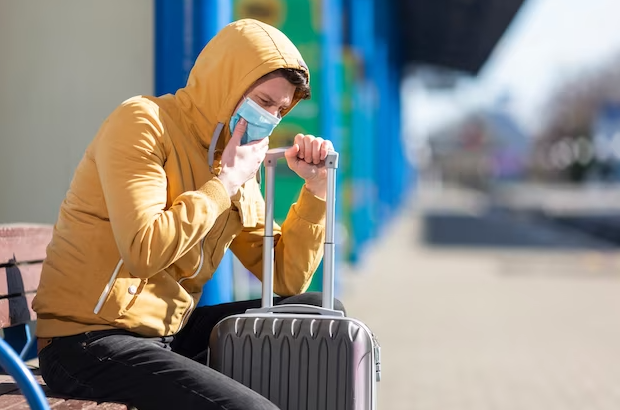If you or a loved one suffer from allergies, you know its impact on quality of life. For those who love to travel, allergies can present a real challenge. Airports, hotels, and other public spaces can be breeding grounds for mold and other allergens, leading to uncomfortable symptoms in the afflicted person.
Fortunately, preventative measures can be taken to control the air quality to prevent allergies from ruining your travels. Investing in a high-quality, properly maintained HVAC system can make all the difference in providing relief from pesky allergies.
In this blog, we’ll discuss how by installing and maintaining high-efficiency filters and modern equipment, HVAC systems can help to reduce allergen levels and create a more comfortable environment for travelers.
Understanding Allergies and Their Impact on Travelers
Allergies can have a significant impact on travelers, affecting their health, comfort, and overall travel experience. Here are some key points to understand about allergies and their effects on travelers:
- Allergies can occur in various forms: Allergies can manifest as hay fever (allergic rhinitis), asthma, food allergies, insect allergies, drug allergies, or skin allergies (such as contact dermatitis). Travelers may have any of these allergy types, each with its unique triggers and symptoms.
- Allergy triggers may vary by location: Different regions have different allergens that can trigger allergic reactions. For example, pollen allergies may be more prevalent in rural or natural areas, while dust mites or mold allergies may be more common in humid or poorly ventilated environments. Travelers should research the allergens specific to their destination and plan accordingly.
- Allergy symptoms can disrupt travel plans: Allergic reactions can range from mild to severe and may include symptoms such as sneezing, runny nose, congestion, coughing, wheezing, hives, itching, swelling, or gastrointestinal issues. These symptoms can interfere with travel activities and make it challenging to fully enjoy the trip.
- Challenges with unfamiliar foods: Travelers with food allergies may face difficulties in countries where they are not familiar with the local cuisine or ingredients. Language barriers can make it challenging to communicate specific dietary restrictions, increasing the risk of accidental exposure to allergens.
- Access to suitable medical care: In the event of a severe allergic reaction, access to appropriate medical care becomes vital. Travelers should research local medical facilities and emergency services at their destination, and ensure they have travel insurance that covers allergy-related emergencies.
- Precautions and preparedness: Travelers with allergies should take the necessary precautions and be prepared:
- Carry prescribed medications and allergy management tools (such as epinephrine auto-injectors) in their carry-on luggage.
- Wear medical alert bracelets or carry allergy identification cards to provide important information in case of an emergency.
- Pack appropriate clothing and protective items, such as hypoallergenic bedding covers or insect repellents, to minimize exposure to potential allergens.
Travel can be quite enjoyable. But in order to travel safely and enjoyably for individuals who have severe allergies, advance planning is necessary. It is imperative to speak with a healthcare provider before travelling so that you can ensure you have the knowledge and safeguards needed to avoid an allergic reaction in a strange environment. You can make sure your trip is worry-free by being aware of your sensitivities and adhering to the suggested procedures. This will allow you to concentrate more on what really matters: making unforgettable memories.
HVAC Systems: The Role of HVAC Systems in Maintaining Air Quality
HVAC (Heating, Ventilation, and Air Conditioning) systems play a crucial role in maintaining indoor air quality in various environments, including residential, commercial, and industrial buildings.
HVAC installation in Dallas, London, and elsewhere is becoming more widespread as urban areas expand and become denserly populated. The expanding need for HVAC installation in big cities is partly due to the expansion of indoor air quality services, such as air conditioning and heating.
The ease and comfort of customers’ homes are being improved more than ever thanks to the expanding trend of integrating HVAC systems into urban living areas. HVAC installation is gaining traction and importance as a vital aspect of modern living as metropolitan areas expand to meet the needs of a growing population.
Following are some key ways in which HVAC systems contribute to air quality:
Temperature and Humidity Control
HVAC systems regulate the temperature and humidity levels in indoor spaces. Proper temperature and humidity control help create a comfortable and healthy environment. Excessive humidity can promote the growth of mold and mildew, while very low humidity can cause dryness and respiratory discomfort.
Ventilation
HVAC systems provide ventilation, which is essential for fresh air exchange. Ventilation helps remove indoor air pollutants, such as volatile organic compounds (VOCs), odors, and airborne contaminants. It also helps dilute and remove carbon dioxide (CO2) produced by occupants, which can be detrimental to health if concentrations become too high.
Air Filtration
HVAC systems often incorporate air filters that capture airborne particles, such as dust, pollen, pet dander, and other allergens. These filters can help improve indoor air quality by reducing the presence of allergens and preventing them from circulating in the air. High-efficiency particulate air (HEPA) filters are especially effective in removing smaller particles.
Source Control
HVAC systems can be designed to incorporate source control mechanisms, such as localized exhaust systems or air purifiers, to target specific sources of pollutants. For example, in commercial kitchens, specialized exhaust hoods are used to capture and remove cooking fumes and grease particles, preventing them from spreading to other areas.
Indoor Air Circulation
HVAC systems facilitate the circulation of air throughout a building, which helps prevent the stagnation of indoor air. By continuously moving air, HVAC systems reduce the buildup of pollutants and maintain consistent air quality in different areas.
Outdoor Air Intake
HVAC systems can bring in fresh outdoor air to improve indoor air quality. Outdoor air is typically cleaner than indoor air, and introducing it into a building helps dilute pollutants and maintain better overall air quality. However, this intake should be properly filtered and controlled to prevent the entry of outdoor pollutants.
It’s important to note that the design, installation, operation, and maintenance of HVAC systems significantly impact their effectiveness in maintaining air quality. Regular maintenance, including filter replacements and system inspections, is crucial to ensure optimal performance and prevent the accumulation of pollutants within the system itself.
Tips and Tricks for Maintaining Air Quality Through HVAC Systems
Here are some tips and tricks for maintaining air quality through HVAC systems:
Regular Maintenance
Schedule regular maintenance for your HVAC system to ensure its optimal performance. This includes changing air filters, cleaning coils, checking ductwork for leaks, and inspecting all components. Regular maintenance prevents the buildup of contaminants and ensures proper airflow.
Use High-Quality Air Filters
Choose high-efficiency air filters, such as HEPA filters, to effectively capture small particles and allergens. Check the MERV (Minimum Efficiency Reporting Value) rating of the filter and replace it as recommended by the manufacturer.
Maintain Proper Humidity Levels
Monitor and control humidity levels in your indoor spaces. High humidity can encourage mold and mildew growth, while low humidity can cause dryness and discomfort. Use humidifiers or dehumidifiers as needed to maintain an optimal humidity range (usually between 30% and 50%).
Ensure Proper Ventilation
Proper ventilation is essential for maintaining good air quality. Ensure your HVAC system provides adequate fresh air exchange by checking the outdoor air intake and exhaust systems. Consider using energy recovery ventilators (ERVs) or heat recovery ventilators (HRVs) to maximize ventilation efficiency.
Seal and Insulate Ductwork
Leaky ductwork can allow contaminants to enter the system and spread throughout the building. Inspect and seal any gaps or leaks in the ductwork to prevent air contamination and maintain proper airflow.
Control Indoor Pollution Sources
Minimize indoor pollutant sources like smoking, chemical cleaners, and volatile organic compounds (VOCs). Properly ventilate areas with pollutant sources and consider using environmentally friendly cleaning products.
Regularly Clean and Dust
Regularly clean and dust your indoor spaces to remove accumulated dust, pet dander, and other allergens. This reduces the workload on your HVAC system and prevents the recirculation of contaminants.
Monitor Carbon Monoxide (CO) Levels
Install carbon monoxide detectors in your home or building to detect any potential leaks from fuel-burning appliances. Carbon monoxide is a colorless and odorless gas that can be harmful if not detected.
Consider Air Purifiers
In areas with specific air quality concerns, consider using portable air purifiers or integrating air purifiers into your HVAC system. These devices can help remove additional contaminants and improve air quality.
Educate Occupants
Educate occupants about good indoor air quality practices, such as proper ventilation, regular cleaning, and reporting any HVAC system issues. Encourage proper behavior to maintain a healthy indoor environment.
Remember, it’s essential to consult with an HVAC contractor or professionals for specific advice and guidance tailored to your system and needs. They can provide expert recommendations on optimizing your HVAC system for maintaining air quality.
Conclusion
For travelers with allergies, air quality can be an important factor in their comfort and satisfaction. With the right HVAC system, you can improve air quality to help reduce allergy triggers and provide much-needed relief. HVAC systems can contribute to air quality in a variety of ways, from regulating temperature and humidity to filtering air and removing pollutants.
To get the most out of your HVAC system, it’s important to schedule regular maintenance, choose a high-quality air filter, manage indoor pollutants, and properly ventilate your space. Additionally, educate occupants about good air quality practices and encourage behaviors that contribute to clean air.
With these tips and tricks, you can maintain a cleaner, healthier living and travel environment for allergy sufferers.







